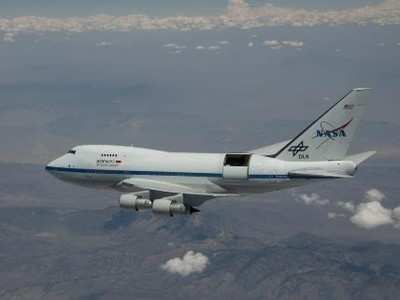Sun, Apr 22, 2012
Hi-Res Airborne Wideband Camera To Fly On SOFIA Aircraft
NASA has selected a science instrument upgrade to the Stratospheric Observatory for Infrared Astronomy (SOFIA) airborne observatory. The instrument, the High-resolution Airborne Wideband Camera (HAWC), will provide a sensitive, versatile and reliable imaging capability to the SOFIA user community. The upgrade involves two proposals that will allow the observatory to measure the structure and strength of magnetic fields in diverse objects throughout the universe, such as star-forming clouds and galaxies. This will help astronomers better understand how stars, planets and galaxies form and evolve.

SOFIA is a highly modified Boeing 747SP aircraft that carries a telescope with a 100-inch (2.5-meter) diameter reflecting mirror that conducts astronomy research not possible with ground-based telescopes. By operating in the stratosphere at altitudes up to 45,000 feet, SOFIA can make observations above the water vapor in Earth's lower atmosphere. "SOFIA has the ability to become a world-class airborne observatory that complements the Hubble, Spitzer and Herschel space telescopes," said John Grunsfeld, NASA's Science Mission Directorate associate administrator. "This upgrade will greatly broaden SOFIA's capabilities."
Last August, the agency released an Announcement of Opportunity for SOFIA second-generation instrument investigations and received 11 proposals. The selected proposals were judged to have the best science value and feasible development plans.
The selected proposals are:
- The High-resolution Airborne Wideband Camera Polarization (HAWC-Pol), Charles Dowell, principal investigator, NASA's Jet Propulsion Laboratory, Pasadena, CA. This investigation upgrades the HAWC instrument to include the capability to make polarimetric observations at far-infrared wavelengths. The investigation's main goals are to measure the magnetic field in the interstellar medium, star forming regions and the center of the Milky Way.
- HAWC++, Johannes Staguhn, Johns Hopkins University, Baltimore, MD. This investigation will provide a sensitive, large-format detector array to the HAWC-Pol investigation, increasing its observing efficiency and providing a broader range of targets.
(Image provided by NASA)
More News
Also: Vertical Flight Society, NBAA Maintenance Conference, GA Honored, AMT Scholarship For the first time, students from Embry-Riddle’s Daytona Beach, Florida, campus took t>[...]
Hazardous Weather Information Summary of significant meteorological information (SIGMET/WS), convective significant meteorological information (convective SIGMET/WST), urgent pilot>[...]
"The need for innovation at speed and scale is greater than ever. The X-62A VISTA is a crucial platform in our efforts to develop, test and integrate AI, as well as to establish AI>[...]
(FAA) Inspector Observed That Both Fuel Tanks Were Intact And That Only A Minimal Amount Of Fuel Remained In Each Analysis: According to the pilot, approximately 8 miles from the d>[...]
“Pyka’s Pelican Cargo is unlike any other UAS solution on the market for contested logistics. We assessed a number of leading capabilities and concluded that the Pelica>[...]
 Airborne-Flight Training 05.09.24: ERAU at AIAA, LIFT Diamond Buy, Epic A&P
Airborne-Flight Training 05.09.24: ERAU at AIAA, LIFT Diamond Buy, Epic A&P ANN's Daily Aero-Term (05.07.24): Hazardous Weather Information
ANN's Daily Aero-Term (05.07.24): Hazardous Weather Information Aero-News: Quote of the Day (05.07.24)
Aero-News: Quote of the Day (05.07.24) NTSB Final Report: Cessna 150
NTSB Final Report: Cessna 150 Aero-News: Quote of the Day (05.08.24)
Aero-News: Quote of the Day (05.08.24)



